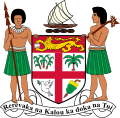
The Government of Barbados (GoB), is a unitary parliamentary republic, where the President of Barbados represents as the head of state and the Prime Minister of Barbados represents as the head of government.
In most common law jurisdictions, the attorney general or attorney-general is the main legal advisor to the government. The plural is attorneys general. In some jurisdictions, attorneys general also have executive responsibility for law enforcement, prosecutions or even responsibility for legal affairs generally. In practice, the extent to which the attorney general personally provides legal advice to the government varies between jurisdictions, and even between individual office-holders within the same jurisdiction, often depending on the level and nature of the office-holder's prior legal experience.

The politics of Fiji take place within the framework of a parliamentary representative democratic republic. Fiji has a multiparty system with the Prime Minister of Fiji as head of government. The executive power is exercised by the government. Legislative power is vested in both the government and the Parliament of Fiji. The judiciary is mostly independent of the executive and the legislature.

The Fiji Labour Party, also known as Fiji Labour, is a political party in Fiji. Most of its support is from the Indo-Fijian community, although it is officially multiracial and its first leader was an indigenous Fijian, Dr. Timoci Bavadra. The party has been elected to power twice, with Timoci Bavadra and Mahendra Chaudhry becoming prime minister in 1987 and 1999 respectively. On both occasions, the resulting government was rapidly overthrown by a coup.

The Cabinet of Fiji is a Government body of Ministers appointed by the Prime Minister of Fiji and responsible to the Parliament of Fiji. The Cabinet's constitutional basis is sections 90 to 96 of the 2013 Constitution of Fiji.
Jai Ram Reddy, CF was an Indo-Fijian politician, who had a distinguished career in both the legislative and judicial branches of the Fijian government. In 1998, he received Fiji's highest honour, the Companion of the Order of Fiji, in recognition of his services to his country.
Chapter 6: The Parliament.Chapter 6 of the Fiji Constitution is titled The Parliament. The five Parts, further subdivided into forty sections making up this chapter, set out the composition, functions, and powers of Fiji's bicameral legislature.
Chapter 7: Executive Government.Chapter 7 of the 1997 Constitution is titled Executive Government. There are five Parts, further subdivided into thirty sections, which set out the organization, functions, and responsibilities of the executive branch of government. Modeled on the Westminster system, Fiji's constitution does not separate the Executive and Legislative branches of government as strictly as do many democracies, but despite considerable overlap, the branches of government are nevertheless constitutionally distinct.
Chapter 10: State Services.Chapter 10 of the 1997 Constitution of Fiji is titled State Services. Its fifteen sections establish certain civil service offices, specify their functions and jurisdictions, set out the qualifications and preconditions required of persons holding such offices, and prescribes the manner of their appointment.

The Dewan Rakyat is the lower house of the bicameral Parliament, the federal legislature of Malaysia. The chamber and its powers are established by Article 44 of the Constitution of Malaysia. The Dewan Rakyat sits in the Houses of Parliament in Kuala Lumpur, along with the Dewan Negara, the upper house.

The National Federation Party is a Fijian political party founded by A.D. Patel in November 1968, as a merger of the Federation Party and the National Democratic Party. Though it claimed to represent all Fiji Islanders, it was supported, in practice, almost exclusively by Indo-Fijians whose ancestors had come to Fiji between 1879 and 1916, mostly as indentured labourers. However, in the 2018 general election, the party recorded a considerable change in its support base due to the inclusion of more indigenous Fijian candidates.

The Australian Government, also known as the Commonwealth Government, is the national government of Australia, a federal parliamentary constitutional monarchy. Like other Westminster-style systems of government, the Australian Government is made up of three branches: the executive, the legislative, and the judicial.

The Attorney-General is a political and legal officer in New Zealand. The Attorney-General is simultaneously a ministerial position and the chief law officer of the Crown, and has responsibility for supervising New Zealand law and advising the government on legal matters. The Attorney-General serves both a political and apolitical function. The current Attorney-General is David Parker.
Sir Vijay Raghubar Singh, KBE was an Indo-Fijian lawyer and politician who held Cabinet office in the 1960s and 1970s. Vijay Singh served in Prime Minister Ratu Sir Kamisese Mara's government in a variety of positions, including Attorney-General, and was president of the Indian Alliance, a division of the ruling Alliance Party. He quit the party in 1979 following disagreement with Alliance leadership and later joined the opposition National Federation Party. Vijay Singh was involved in the restructure of the Fiji sugar industry and was a leading member of the Jaycees movement in Fiji.

Local elections were held in Fiji on 22 October 2005 to elect the councils of eleven municipalities. In Suva, the elections for the Suva City Council were postponed until 12 November due to the death of two candidates; the death of a candidate in Lautoka also resulted in the postponement of the poll in one of the four wards.
Jagannath Sami has been a soccer player representing a premier district side in the Fiji Football Association competitions, a leader of the sugar mill workers, a leader of a farmers' union, a politician and chief executive officer of the Sugar Cane Growers Council of Fiji but he is best known for the controversy surrounding his dismissal as the CEO of the SCGC by the military regime of Commodore Josaia Voreqe (Frank) Bainimarama following the military coup of 2006.

Aiyaz Sayed-Khaiyum is an Fijian politician and a former cabinet minister. He was the Fijian attorney general and the Minister for Economy, Civil Service and Communications, and also served as the minister responsible for climate change under the FijiFirst government. He is the third-highest polling candidate from the Fijian general elections of 2014 and 2018.

The New Zealand Government is the central government through which political authority is exercised in New Zealand. As in most other parliamentary democracies, the term "Government" refers chiefly to the executive branch, and more specifically to the collective ministry directing the executive. Based on the principle of responsible government, it operates within the framework that "the Queen reigns, but the government rules, so long as it has the support of the House of Representatives". The Cabinet Manual describes the main laws, rules and conventions affecting the conduct and operation of the Government.
The Consumer Council of Fiji is a statutory consumer agency that promotes and lobbies for consumer rights and interests in the Fiji Islands.









